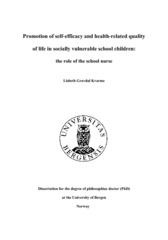| dc.contributor.author | Kvarme, Lisbeth Gravdal | en_US |
| dc.date.accessioned | 2011-02-21T13:45:52Z | |
| dc.date.available | 2011-02-21T13:45:52Z | |
| dc.date.issued | 2011-01-21 | eng |
| dc.identifier.isbn | 978-82-308-1683-7 (print version) | en_US |
| dc.identifier.uri | https://hdl.handle.net/1956/4521 | |
| dc.description.abstract | Background: The school is an important setting for promoting social skills that may enhance the health of children. The quality of life of school children may be influenced by social and individual resources such as social support and self-efficacy. Research on adults shows that self-efficacy is an important determinant in improving their quality of life. However, less research has been conducted on the association between self-efficacy and quality of life in children. Bullying can contribute to psychosocial problems and low quality of life in victims of bullying. Children who are bullied or socially withdrawn are vulnerable children that may feel excluded or unsafe at school. Many of these children report that they lack friends, are lonely, and have low self-efficacy at school. Increasing self-efficacy may improve young people’s beliefs in their ability to stand up for themselves and to attain their goals in school. Participating in small discussion groups may enhance self-efficacy. The Solution-focused Approach (SFA) is a strength-based approach that emphasizes the resources of individuals and how these can be applied to the change process by focusing on solutions rather than problems. Socially vulnerable children with problems such as withdrawal or being bullied face great challenges in school that may influence their health. For school nurses, cooperating with the school and families to promote health among these children is therefore an important issue. The present thesis – “Promoting self-efficacy and health-related quality of life in socially vulnerable school children” – aims further to investigate factors that promote health and to evaluate the effect of an SFA intervention. Aims: The main aim of the present study is to investigate factors that promote psychosocial health in socially vulnerable school children aged 12–13 years. These children are socially withdrawn and are victims of bullying in school settings. The main study consists of three component studies. The aim of the first study is to examine the association between general self-efficacy (GSE) and health-related quality of life (HRQOL), and to explore how this association is related to socio-demographic characteristics in school children. The aim of the second study is to explore the effect of a group intervention based on the solution-focused approach on self-efficacy among a group of socially withdrawn children and to explore possible sex-based differences. The aim of the third study is to explore how school children experience being bullied, how they envisage their dream day, and what kind of help they want. Method: To reach the main aim, the study consists of three studies. All the participants in these studies were from Eastern Norway and were aged 12–13 years. The present study consists of three designs: The first study (paper I) is a cross-sectional design. The second study (paper II) is a non-randomized controlled trial, and the third study (Paper III) is a focus group design. The first study assesses the association of GSE and HRQOL among school children. The KINDL questionnaire developed by Ravens-Sieberer & Bullinger was used to measure HRQOL. Schwarzer’s questionnaire based on Bandura’s concept of self-efficacy was used to measure GSE. The second study is written on the basis of data from a non-randomized control trial and uses Schwarzer’s GSE questionnaire in addition to domain-specific self-efficacy developed by Choi et al. In the first study, T-tests were computed to compare mean subscale values between HRQOL and socio-demographic variables. Single and multiple regression analyses were performed to explore associations among GSE, HRQOL and socio-demographic variables. In the second study, analysis of covariance (ANCOVA) was used to compare differences in the mean changes between the experimental and control groups from baseline (t0) to immediately after the intervention (t1) and three months after the intervention (t2). The third study is written on the basis of data from focus-group interviews with a semi-structured interview format. The collection and analysis of data followed Kvale’s guidelines for qualitative research. The studies were performed between autumn 2006 and spring 2008. Results: Results from the first study showed a strong positive significant association between GSE and HRQOL for all subscales and total scales of HRQOL. In the second and third studies, we chose a group of socially vulnerable children with psychosocial challenges, including socially withdrawn children and bullied children. The socially withdrawn children were a target group in the SFA intervention in the second study. The second study showed that the participants increased their level of self-efficacy post intervention. Girls showed a greater increase in GSE immediately after the intervention, whereas boys showed a delayed increase three months after the intervention. The bullied children were the target group in the third study. We explored how they experienced being bullied in a health promotion perspective with focus on their dream day, and what kind of help they wanted. Results from this study showed that their dream day was a day when they felt included by peers, and they wanted help to stop the bullying immediately. Conclusion: The main aim of the present study is to investigate factors that promote psychosocial health in socially vulnerable school children. Socially vulnerable children experience being rejected and excluded, and they need to be helped and included in school. Promoting health by creating a safe school environment and preventing bullying is therefore an important issue for a school health service. Socially vulnerable children need help to improve their social skills and need to receive social support. An intervention such as SFA may improve self-efficacy in socially withdrawn children. The studies included in this thesis reveal the significance of focusing on promoting self-efficacy and health-related quality of life in school children. | en_US |
| dc.language.iso | eng | eng |
| dc.publisher | The University of Bergen | eng |
| dc.relation.haspart | Paper I: Health and Quality of Life Outcomes 7(85), Kvarme, L. G.: Haraldstad, K.; Helseth, S.; Sørum, R.; Natvig, G. K., Association between general self-efficacy and health-related quality of life among 12-13 years old school children: a cross-sectional survey. Copyright 2009 Kvarme et al; licensee BioMed Central. Reproduced with permission. Published version. The published version is also available at: <a href="http://dx.doi.org/10.1186/1477-7525-7-85" target="_blank">http://dx.doi.org/10.1186/1477-7525-7-85</a> | en_US |
| dc.relation.haspart | Paper II: International Journal of Nursing Studies 47(11), Kvarme, L. G.; Helseth, S.; Haugland, S.; Luth-Hansen, V.; Sørum, R.; Natvig G. K., The effect of a solution-focused approach to improve self-efficacy in socially withdrawn school children: a non-randomized controlled trial, pp. 1389-1396. Copyright 2010 Elsevier. Full text not available in BORA due to publisher restrictions. The published version is available at: <a href="http://dx.doi.org/10.1016/j.ijnurstu.2010.05.001" target="_blank">http://dx.doi.org/10.1016/j.ijnurstu.2010.05.001</a> | en_US |
| dc.relation.haspart | Paper III: Scandinavian Journal of Caring Science 24(4), Kvarme, L. G.; Helseth, S.; Sæteren, B.; Natvig, G. K., School children’s experiences of being bullied, and how they envisage their dream day, pp. 791-798. Copyright 2010 The Authors. Journal compilation 2010 Nordic College of Caring Science. Published by Wiley-Blackwell. Full text not available in BORA due to publisher restrictions. The published version is available at: <a href="http://dx.doi.org/10.1111/j.1471-6712.2010.00777.x" target="_blank">http://dx.doi.org/10.1111/j.1471-6712.2010.00777.x</a> | en_US |
| dc.subject | Quality of life | eng |
| dc.subject | School Nursing | eng |
| dc.subject | Self Efficacy | eng |
| dc.subject | Child Behavior | eng |
| dc.title | Promotion of self-efficacy and health-related quality of life in socially vulnerable school children: the role of the school nurse | en_US |
| dc.type | Doctoral thesis | |
| dc.rights.holder | Copyright the author. All rights reserved | |
| dc.rights.holder | The author | |
| dc.subject.nsi | VDP::Medical disciplines: 700::Health sciences: 800::Community medicine, Social medicine: 801 | eng |


